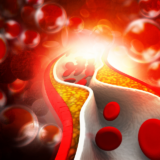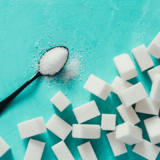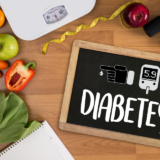All About Belly Fat






Belly fat
Belly fat is excess abdominal fat surrounding the organs in your stomach that results in increased waist size. It is also known as central adiposity or abdominal obesity. Abdominal obesity is defined as having a waist circumference greater than 40 inches for a man or 35 inches for a woman. Many people have concerns about too much belly fat, and a variety of factors can cause you to get a bigger midsection. People often put on more belly fat when they become middle-aged, after pregnancy, or when they eat or drink more calories than they burn. They don’t call it a beer belly for nothing. But no matter what the cause, a bulging belly is something many people want to reduce.
You may be surprised to find out that even if you’re relatively slim, you can still have a high percentage of body fat, particularly in your midsection. Also, if you’re overweight, you need to understand that belly fat truly is different from other fat that’s distributed to other areas of your body.
There are three types of fat:
Triglycerides -This type of fat circulates in your bloodstream. It makes up about 95 percent of the fat within your body
Subcutaneous fat – This fat is the layer that lies directly below the skin’s surface, between the skin and the abdominal wall; and
Visceral fat – Visceral fat is located beneath the muscles in your stomach and poses many dangers to your health when there is too much of it. Visceral fat hangs beneath the muscles in your stomach. This placement is what makes the fat so damaging to your health. Because this fat is so close to your internal organs, it becomes their best energy source.
Belly fat doesn’t just sit there; it can have negative impacts on almost every organ in your body through the productions of excess hormones and chemicals. Having too much visceral fat can put you at risk for many other health issues such as cardiovascular disease, Type 2 diabetes and colorectal cancer
Belly fat can also be independent from overall body fat, meaning someone who’s not overweight could still have a lot of excess fat around his or her waist.
The good news: For most people, when they lose weight, it tends to come off the middle. People also tend to shed belly fat a little quicker than other areas, because the tummy is just a temporary holding zone for fat.
One of the most common causes of belly fat is simply overeating and moving too little. Over the time, our lifestyle tend become more sedentary.
We spend less time walking, taking the stairs, and exercising. When we eat more calories than we use each day, an energy imbalance causes weight gain. But there are other causes of belly fat, too.1
Also, as we age, our metabolism naturally slows down, and total body fat gradually increases. Women tend to gain a higher fat percentage than men as they get older. Body fat distribution changes in menopause, which causes more fat to be directed to your abdomen as well.
Heredity can also be a factor. Apart from it being hereditary, hormones and hormonal changes, as well as stress, can also affect belly fat accumulation.
What does belly fat do to your body
When you’re at an ideal weight, the hormones and chemicals secreted by fat cells are actually healthy. They do a number of positive things, such as regulate insulin, help to regulate appetite by allowing you to feel satisfied after eating, and even help burn stored fat.
The problem arises when you have more and larger fat cells than normal, which often occurs in an individual who’s overweight. These larger fat cells produce more hormones and chemicals than your body needs, which can impact your health over time and place you at risk. People who store excess fat around their midsection are at much greater risk for a number of health problems, including heart disease, stroke, sudden cardiac death, certain cancers and even dementia
What makes visceral fat cells more dangerous than other fat cells is that they’re thought to produce an even greater amount of harmful chemicals, such as excessive hormones and toxins. And because this fat is so close to all your organs, it can be damaging to all your body’s systems.
Many factors play a part in the accumulation of extra body fat. For many people, a combination of eating habits and lifestyle factors cause a gradual increase in body fat over time. These same unhealthy patterns can also contribute to other obesity-linked problems, like stress and depression that can, in turn, make it more difficult to eat well and exercise.
Key factors related to weight gain include:
- Inactivity – If a person consumes more calories than they burn off, they will put on weight. An inactive lifestyle makes it hard for a person to get rid of excess fat, particularly around the abdomen. Your body needs regular exercise to maintain a healthy weight. This includes not just occasional bursts of physical activity (such as a trip to the gym), but moving around throughout the day. Sitting for long periods each day is linked to higher rates of death and health problems—a condition known as “sitting disease.”
- Poor eating habits – You need lots of whole grains, fruits and vegetables, and healthy proteins. Foods in which more than 30% of the calories come from saturated fat are much more likely to cause your body to accumulate fat. Drinks with added sugar and alcohol can also be a source of wasted calories.
- Aging – Fat tends to accumulate as we age because of changes in hormones and metabolism, especially after menopause (Menopause in women – because of the fall in estrogen levels dramatically causes fat accumulation around the belly). While you can’t stop aging, you can adjust your portions and eating habits as you expect this natural tendency.
- Genes – Certain genes have been linked with belly fat or obesity. In addition to being more likely to carry excess weight, people with these genes have been shown to face a significant risk of developing heart disease and diabetes. Genes also appear to play a role in high waist-to-hip ratios and storage of excess calories as belly fat.
- Stress – A steroid hormone known as cortisol helps the body control and deal with stress. When a person is in a dangerous or high-pressure situation, their body releases cortisol, and this can impact on their metabolism. People often reach for food for comfort when they feel stressed, and cortisol causes the excess calories to remain around the belly and other areas of the body for later use. These factors not only affect your mood—they also affect your body. Hormonal changes and other factors associated with stress, depression and insufficient sleep can change how your body processes and stores fat, making it more difficult to shed pounds. These factors also make it harder to maintain healthy eating and exercise habits.
- Sugary foods and beverages – When we drink sugary beverages etc, the calories, there is a feeling of full experienced and so it needs to be compensated by eating less of other foods instead. Sugary food can cause weight gain, slow a person’s metabolism and reduce a person’s ability to burn fat
- Alcohol – Consuming excess alcohol can cause a variety of health problems, including liver disease and inflammation.
- Protein deficient or low protein diets – Low-protein, high-carb diets may also affect weight. Protein helps a person feel fuller for longer, and people who do not include lean protein in their diet may eat more food overall.
- Trans fats – can cause inflammation and may lead to obesity. Trans fats are in many foods, including fast food and baked goods. Trans fats increase inflammation that may drive insulin resistance and the accumulation of belly fat
- Sleep – Getting enough sleep is crucial for your health. Short sleep or poor-quality sleep may lead to weight gain, including belly fat accumulation. Sleep disorders may also lead to weight gain. One of the most common disorders, sleep apnea, is a condition in which breathing stops repeatedly during the night due to soft tissue in the throat blocking the airway.
Heart ailments
Belly fat is a major risk factor for repeat heart attacks, even more than BMI readings. The reason abdominal obesity is very common in people with a first heart attack is that it is closely linked with conditions that accelerate the clogging of arteries through atherosclerosis. These conditions include increased blood pressure, high blood sugar, and insulin resistance (diabetes) as well as raised blood lipid levels. Patients with increasing levels of abdominal obesity still had a raised risk for recurrent events despite being on therapies that lower traditional risk factors connected with abdominal obesity – such as anti-hypertensives, diabetes medication and lipid lowering drugs.
A first attack can cause inflammation, stress, and changes in arteries that can lead to a second attack. Abdominal obesity could also increase a person’s risk for a second heart attack even if they are taking proper medication and following other medical advice. Maintaining a healthy waist circumference is important for preventing future heart attacks and strokes regardless of how many drugs you may be taking or how healthy your blood tests are. Abdominal obesity can be tackled by eating a healthy and balanced diet and regular physical activity
The dangers of belly fat
The most important measurements are waist circumference and waist-to-hip ratio when it comes to talking about dangers of belly fat. Waist measurement and waist-to-hip ratio measurements have been shown to be quite useful in predicting risk of heart attacks. Waist measurements are more useful in predicting cardiovascular risk than BMI as they are specific to abdominal fat.
Effective Tips to Lose Belly Fat
1. Eat plenty of soluble fiber
Soluble fiber absorbs water and forms a gel that helps slow down food as it passes through your digestive system. It will help you to lose weight by increasing fullness and reducing calorie absorption. Try to include plenty of high fiber foods in your weight loss diet.
2. Addition of fruits, veggies, and whole grains to the diet
Natural foods like fruits, vegetables, and whole grains are full of antioxidants, which have anti-inflammatory properties and may therefore actually prevent belly fat. Reduce intake of carbs, specially refined carbs, a high intake of refined carbs is associated with excessive belly fat. Consider reducing your carb intake or replacing refined carbs in your diet with healthy carb sources, such as whole grains, legumes, or vegetables.
3. Eat healthy fats
The body doesn’t react to all fats in the same way. Research correlates high intake of saturated fat (the kind in meat and dairy) to increased visceral fat. On the other hand, monounsaturated fats (the kind in olive oil and avocados) and specific types of polyunsaturated fats (mainly omega-3s, found in walnuts, sunflower seeds, and fatty fish like salmon) have anti-inflammatory effects in the body, and if eaten in proper portions may do your body good.
4. Take the stress levels down a notch.
Everyone has stress. Whatever your source of stress is how you handle it matters. Having too much of it may make it harder for you to drop unwanted pounds, especially from the middle. It’s also due to the stress hormone cortisol, which may increase the amount of fat in the body clings to and enlarge the fat cells. Higher levels of cortisol have been linked to more visceral fat. The best things you can do include relaxing with friends and family, meditating, exercising to blow off steam, and getting counseling. That leaves you healthier and better prepared to make good choices for yourself
5. Get 7 hours quality sleep each night
Sleep deprivation is linked to an increased risk of weight gain. Getting enough high quality sleep should be one of your main priorities if you plan to lose weight and improve your health.
6. Include apple cider vinegar to your diet
Drinking apple cider vinegar has impressive health benefits, including lowering blood sugar levels. It contains acetic acid, which has been shown to reduce abdominal fat storage
7. Avoid foods that contain Trans fats
High intake of Trans fat leads to increased belly fat gain. Regardless of whether you’re trying to lose weight, limiting your intake of Trans fat is a good idea.
8. Consume fatty fish regularly
Fatty fish are incredibly healthy; they’re rich in high quality protein and omega-3 fats, that protect you from disease. Eating fatty fish or taking omega-3 supplements may improve your overall health. Omega-3 fats may also help reduce visceral fat.
9. Avoid Alcohol
Excessive alcohol intake has been associated with increased belly fat. If you need to reduce your waistline, consider drinking alcohol in moderation or abstaining completely.
10. Eat a high protein diet
High protein foods, such as fish, lean meat, and beans, are ideal if you’re trying to shed some extra pounds around your waist.
11. Avoid sugary foods
Excessive sugar intake is a major cause of weight gain in many people. Limit your intake of candy and processed foods high in added sugar.
12. Do aerobic exercise
Aerobic exercise is an effective weight loss method and it’s particularly effective at slimming your waistline
13. Replace some of your cooking fats with coconut oil
Coconut oil is one of the healthiest fats you can eat. The medium-chain fats in coconut oil may boost metabolism and decrease the amount of fat you store in response to high calorie intake
14. Follow intermittent fasting
Intermittent fasting is an eating pattern that alternates between periods of eating and fasting. Intermittent fasting may be one of the most effective ways to lose weight and belly fat.
Change your lifestyle and combine different methods. Losing weight and keeping it off is difficult unless you permanently change your dietary habits and lifestyle.














13 comments
homepage
May 23, 2021 at 11:22 pm
Your website has provided me personally with merely the data that I required.
I just have been carrying out research on this kind of topic for
quite a while, and it seems to have taken a very long time to find a blog page that gives all of the data i need.
I actually take a look forward to studying more websites authored by you in the future, and will definitely seek right here initially the very next time I
just currently have a fact-finding project.
bianca
June 12, 2021 at 8:24 am
Way cool! Some very valid points! I appreciate
you penning this post and the rest of the site is also really good.
demetriani
June 14, 2021 at 12:51 am
It is appropriate time to make some plans for the future and it’s time to be happy.
I’ve read this post and if I could I desire to suggest you few interesting things or tips.
Maybe you can write next articles referring to this article.
I want too read even more things about it!
bed bugs
August 5, 2021 at 7:10 pm
It’s actually a nice and useful piece of information.
I’m satisfied that you simply shared this helpful info with us.
Please stay us informed like this. Thank you for sharing.
Joe C
August 7, 2021 at 5:53 am
What’s Taking place i am new to this, I stumbled upon this I’ve found
It positively helpful and it has aided me out loads. I hope
to give a contribution & help different users like its helped me.
Good job.
Russel G
August 9, 2021 at 12:15 am
It’s amazing to go to see this web page and reading the views of all colleagues concerning this paragraph, while I am also
zealous of getting know-how.
Mitzi
November 12, 2021 at 3:15 am
It’s a pity you don’t have a donate button! I’d certainly donate to this superb blog!
I guess for now I’ll settle for bookmarking and adding your RSS feed to my Google account. I look forward to
new updates and will share this site with my Facebook group.
Chat soon!
WAC info
August 22, 2022 at 6:14 am
Amazing issues here. I’m very satisfied to look your post.
Thank you a lot and I am taking a look ahead to contact you.
Fredric
September 19, 2022 at 7:48 am
Way cool! Some extremely valid points! I appreciate you
penning this write-up and the rest of the site
is also really good.
Kino
May 6, 2023 at 10:59 am
Good information. Lucky me I came across your site by chance (stumbleupon).
I’ve saved it foor later!
B Roy
May 9, 2023 at 12:59 am
Pretty component to content. I simply stumbleed upon our site and
in accession capitazl to claim tjat I acquire
in faact loved account your blkg posts. Anyway I’ll be subscribing tto your eeds orr even I ssuccess you get rkght oof
enhtry tto consistently fast.
John
May 12, 2023 at 11:27 am
Excellent website!
mikeswanton
May 21, 2024 at 6:07 am
I am truly keen of reading this web site’s post
Hope this is updated on a regular basis.